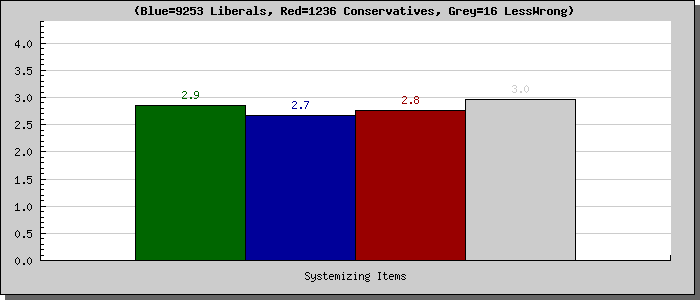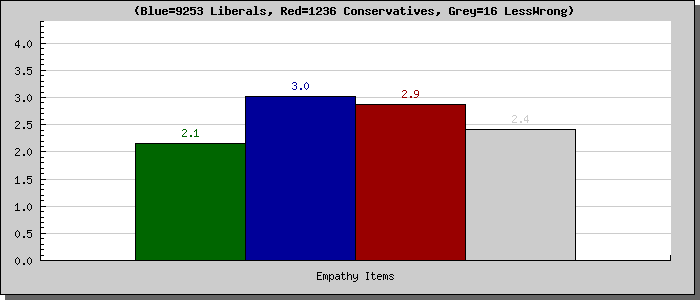YourMorals.Org |
||||
| Home |
Logout | Explore Your Morals | About Us | Links |
| Welcome gwern0@gmail.com - logout | ||||
|
The scale you completed was a combination of the Empathizing and Systemizing scales, created by Simon Baron-Cohen at Cambridge University. (We took 20 items from each scale.) The scales measure two abilities or preferences on which human minds differ. Empathizing is "the drive to identify another person's emotions and thoughts, and to respond to these with an appropriate emotion." Systemizing is "the drive to analyze the variables in a system, and to derive the underlying rules that govern the behavior of the system." In short, empathizing is about understanding the social world whereas systemizing is about understanding the world of inanimate objects and nature. The idea behind the scale is that Baron-Cohen has found large sex differences on both traits. Men tend to score higher than women on systemizing, and lower than women on empathizing. But Baron-Cohen's main interest is not sex differences, it is autism. He has found that people with mild autism or Asperger's syndrome seem to have a kind of "extreme male brain." They love mechanical and classificatory systems, and find it very difficult to get inside people's heads and understand emotional reactions. We are interested in Baron-Cohen's work for political psychology because there are two competing stereotypes about liberals and conservatives. On one hand, conservatives are thought to be a bit more "macho" or masculine than liberals (at least for men), but on the other hand, many political theorists have linked liberalism with a tendency to abstraction, and to thinking about society as a system that can be managed and optimized. We therefore can't predict whether liberals or conservatives will show the more "male" pattern of lower empathy and higher systemizing. Or might liberals score higher on both empathizing and systemizing? Will the story be different for men and women? Let's see! The figure below shows your average score (in green) on the systemizing items, compared to those made by the average Liberal (in blue) respondent and the average Conservative (in red) respondent. Scores range from 1 to 4, and higher numbers indicate a higher degree of systemizing.
 The figure below shows your average score (in green) on the empathizing items, compared to those made by the average Liberal (in blue) respondent and the average Conservative (in red) respondent. Scores range from 1 to 4, and higher numbers indicate a higher degree of empathizing.
 To learn more about systemizing, empathizing, and the scales you just took, please see this article by Daniel Nettle. Or see this Wikipedia page on Baron-Cohen and his research. Return to the "Explore" page. |
|